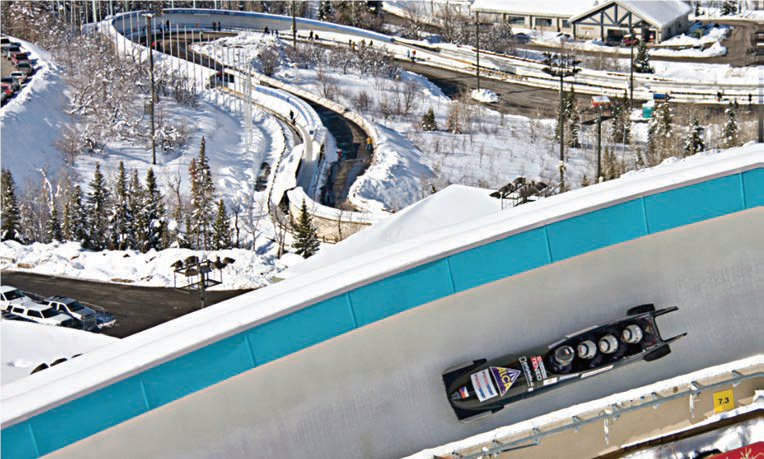By Brice Wallace
Salt Lake City’s biggest obstacle to host an Olympic Winter Games in 2026 or 2030 may not be from competing sites in Switzerland, Sweden or Japan, but instead could be a sun-baked coastal city, according to the leader of the Utah Olympic Legacy Foundation.
{mprestriction ids="1,3"}
The fact that Los Angeles has been awarded the Summer Games in 2028 could work against Salt Lake City’s efforts to land the Winter Olympics either two years before or two years after, Colin Hilton, president and chief executive officer of the foundation, said at a recent event at the University of Utah’s Kem C. Gardner Policy Institute.
The International Olympic Committee’s selection of Los Angeles “threw a little bit of a wrench for us because typically a country would not be considered for another Winter Games after just being awarded a Summer Games,” Hilton said.
“It’s not of an interest of L.A. to have a Winter Games, not of the interest of the U.S. Olympic Committee [for a 2026 Salt Lake City Olympics], but they are supportive of 2030.”
Fraser Bullock, chief operating officer and chief financial officer of the Salt Lake Organizing Committee for the 2002 Olympic Winter Games and co-chairman of a committee exploring a future Salt Lake bid, has visited with officials in Los Angeles organizing its 2028 Summer Games to see if partnerships could help both cities, Hilton said.
“We’ve had that initial contact. We have ideas that we are sharing about how a joint effort could actually benefit L.A. as well as Salt Lake. We think there’s great opportunity in a joint hosting,” he said.
A major concern is that sponsorship dollars would be directed toward one city at the expense of the other. “We think that with two years apart — L.A. in 2028 and Salt Lake in 2030 — there are unique opportunities for partnerships. … There are some interesting things but not yet developed, and I would say we would welcome an increased partnership.”
Among nations that have expressed an interest in bidding for Winter Games in 2026 or 2030 are Switzerland, Sweden, Japan and Canada. In the U.S., Denver and Lake Tahoe/Reno have done likewise. U.S. cities interested in hosting in 2026 must declare their interest by March 31 to the U.S. Olympic Committee.
The International Olympic Committee (IOC) could award both the 2026 and 2030 Games in September 2019. Boosting Salt Lake’s efforts are a new thinking by the IOC that perhaps it should not put a slew of requirements on host cities, and that perhaps future Games should return to places where existing Olympic facilities have been maintained and host regular events, said Hilton, whose foundation oversees the Utah Olympic Park, Utah Olympic Oval and Soldier Hollow Nordic Center.
“We are the poster child of a place that could showcase this transformation of making a more sustainable and logical approach to hosting an Olympics and doing it very cost-effectively and doing it with folks who have experience and that have a set of volunteers who continue to be knowledgeable about [for example] how to be a timer at the Olympic Oval. These are things that take years to develop and we have been doing that,” he said.
“That’s where I say, when the question is, ‘Is the Olympics ever going to come back to Utah?’ [the answer is] absolutely. It’s not a matter of if; it’s a matter of when.”
Hilton said some potential Olympic cities have backed out due to a growing skepticism about the value of hosting the Games. But public support in Utah is clear: A poll last fall indicated 89 percent of Utahns favor bringing back the Games, and the figure was 83 percent in a more-recent poll.
“That isn’t just support,” Hilton said. “That’s almost a mandate for ‘we should do this.’”
Barring the addition of new sports, no new Olympic facilities would need to be built, and funding the Games would come from private sources, sponsorships and the IOC, Hilton said.
The Olympic Exploratory Committee has estimated that hosting in 2026 or 2030 would create an economic impact at least as large as the one from the 2002 Games, which it said was over $6 billion. Those impacts of the 2002 Games include the regional economic impact — direct, indirect and induced effects of new money spent in the state — as well as new infrastructure that remains in place and serves residents and visitors; the surplus from the Games that benefits the local economy; travel and tourism impacts; and intangible impacts, including the positioning of Utah as a winter sports capital, business development opportunities, and increased visibility and awareness about Utah.
Hosting in 2030 would likely generate a surplus, it said. The 2002 Games had a $160 million surplus, of which $76 million went to the foundation, about $60 million was paid back to Utah for its initial investment in the legacy venues, and $25 million was used for improvements to other Olympics-related facilities.{/mprestriction}








